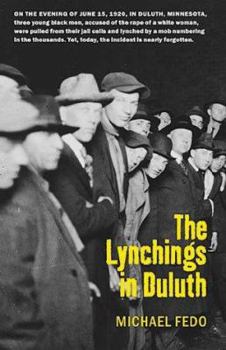Lynchings in Duluth
Select Format
Select Condition 
Book Overview
On the evening of June 15, 1920, in Duluth, Minnesota, three young black men, accused of the rape of a white woman, were pulled from their jail cells and lynched by a mob numbering in the thousands. Michael Fedo, a former journalist, tells the story in a clear, sober manner, weaving a skilful narrative. Using newspaper accounts, court records, state files, and interviews with ageing and often reluctant witnesses, he recounts the small but telling stories of individual participants and observers -- both blacks and whites -- in a manner that casts them as ordinary people caught up in an extraordinary moments of violence and hatred. During the late nineteenth and early twentieth centuries, the lynching of black men was typically a rural, southern phenomenon. This account of the Duluth lynchings shows that the mentality necessary for such events was not particular to any region.
Format:Paperback
Language:English
ISBN:087351386X
ISBN13:9780873513869
Release Date:May 2000
Publisher:Minnesota Historical Society Press
Length:220 Pages
Weight:0.90 lbs.
Dimensions:0.8" x 5.4" x 8.5"
Customer Reviews
4 ratings
A look at the dark underbelly of Minnesota
Published by Thriftbooks.com User , 19 years ago
Much like the public hanging of 38 Dakota in Mankato, MN, the 1920 lynchings that took place in Duluth were part of a dark piece of the state's history that were tacitly buried--almost to the point of being forgotten. Fortunately, Michael Fedo wrote this somewhat comprehensive account of the events and social conditions that culminated in this abhorrent outburst. Unfortunately, the citation is minimal and a couple of key names were changed to protect the people involved; Fedo, a Duluth native himself, originally wrote this book in 1979 (to a lukewarm reception) and seems to have been a bit wary of upsetting people who were involved in the incident and still alive at the time. However, despite these shortcomings, this is one of the only books that documents the lynchings of Elias Clayton, Elmer Jackson, and Isaac McGhie on June 15, 1920, and the trials that followed. (The only other book that I could find that gives a detailed account of the lynchings is John Bessler's LEGACY OF VIOLENCE--much of his material is cited from Fedo's book).
A Sense of Understanding
Published by Thriftbooks.com User , 21 years ago
When I was growing up in the Duluth area, I had heard references to this event in the city's past, but no one seemed to know much of anything about it. Finally, I see and understand more clearly what happened that night in June 1920.I also feel now that I understand the city of Duluth better than I did before I read this book. I always thought that there was a black cloud over the city, but only those who have lived in the city all their lives seemed to be in tune with it. I now see that intense skepticism, lack of passion, and a touch of guilt had been passed down to future generations without those persons even realizing it. I hope that with a memorial on the spot where this tragic event occured that the healing can begin.
A disturbing family secret
Published by Thriftbooks.com User , 23 years ago
I stumbled upon this while doing research on my family--imagine my shock to discover my great-grandfather's name mentioned several times in this book. My mother and I read it apprehensively, unsure of what we would discover. My mother worried that her "pa" would be portrayed as a monster, but Mr. Fedo's writing is factual, fair and honoring of the era's perspective. Disturbing and horrifying, I appreciate this valuable document as a lesson in humanity and a testament to how even the most upstanding, warm people can be capable of abhorrent things.
Compelling and disturbing
Published by Thriftbooks.com User , 24 years ago
I visited Duluth for the first time last year and liked the town so much, I went back three days ago. The title of this book was enough to shock me into buying it and reading it from cover to cover within a few hours of leaving the shop. The subject is depressing, yet fascinating; the book overturned my outsider's assumptions about the town and the state. Fedo does not get sidetracked by excessive detail or the urge to be judgmental; he tells a horrible, simple story in a way that is both easy to read and deeply disturbing. He tries to understand the motivations of most of the key players, the heroes and the villains, and conveys the difficult choices faced by some of those present. For the police and bystanders in Superior Street that day there was a very thin dividing line between complicity and innocence. As William Green asks in the introduction, "at what point is one's guilt by association manifest?". This tragedy could have happened in any state in the country and it would be harsh to say the events of June 1920 suggest that Duluth folk were uniquely bad amongst the people of the North. A set of chance occurrences came together at that moment in that place with consequences that reflect badly on the entire nation in that era. If Duluth is stained by the murders it is as much for the shameful cover-up (the collective amnesia that allowed three victims to lie forgotten for so many decades) as for the events of eighty years ago. Fedo deserves a lot of credit for excavating this episode from his town's past.






